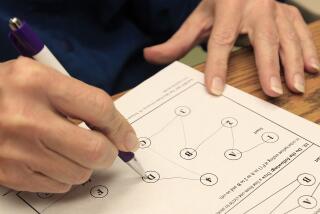Gates’ warning on test scores

- Share via
A recent op-ed article in the Washington Post warned against overusing students’ standardized test scores in evaluating how well teachers are doing their jobs. There would be no surprise about that — if it had been penned by the leader of a teachers union. But it was written by Bill Gates, arguably the most influential voice over the last few years in pushing for the use of test scores to rate teachers.
Gates’ warning was based on a study released in January that his foundation funded. It determined that student scores have a useful but limited place in measuring a teacher’s work, and that some other measurements, such as student surveys, are more consistent.
The billionaire philanthropist’s reasoned perspective is appreciated; the problem is that schools in this country are already well down the testing-and-evaluations road. Prodded heavily by reform groups, many of which receive funding from the Bill & Melinda Gates Foundation, states and school districts have in some cases taken the use of students’ scores to extremes that have no grounding in research, making them count for half or more of a teacher’s rating, or hastily concocting tests to measure unmeasurable subjects — and then applying the results to teachers. The most mocked example is Ohio’s extensive new exam in physical education, which includes measuring whether students’ movements while skipping are adequately smooth.
In 2010, California was denied $700 million in federal Race to the Top funds, largely because it declined to require that student test scores be linked to teacher ratings — something the Obama administration had demanded in return for the money, even though there was little if any evidence that the scores had value as indicators of a teacher’s work.
The Gates Foundation has a deserved reputation for testing its education hypotheses with expansive, high-quality studies. It rightly abandoned its previous campaign for high schools to enroll no more than 500 students after funding a study that found that smaller enrollments alone did not have a big impact on student achievement. But again, because the foundation’s billions were behind the small-school movement, districts across the nation switched to that more expensive model, which is hard for them to undo now.
The new study on teacher evaluations contains interesting findings, but much more research is needed.
When philanthropists have potentially useful ideas about education, they should by all means try them out, establish pilot programs, put their money where their mouths are. But before government officials incorporate those ideas into policy, they must study them carefully and make sure that what sounds reasonable in theory works in practice.
More to Read
A cure for the common opinion
Get thought-provoking perspectives with our weekly newsletter.
You may occasionally receive promotional content from the Los Angeles Times.










